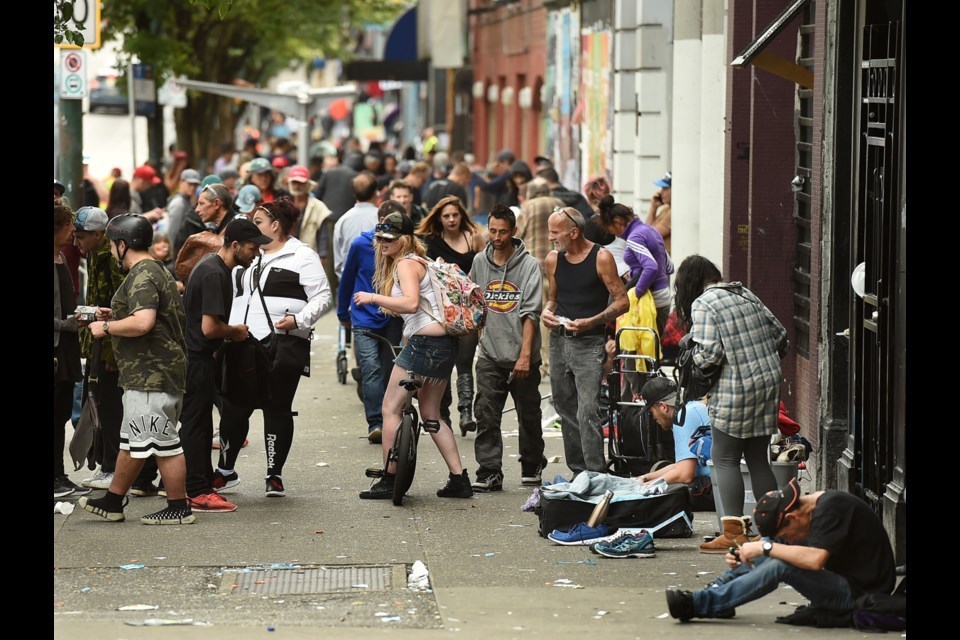Incoming B.C. premier David Eby is promising to take over Vancouver’s Downtown Eastside to stop its continued slide into chaos from tent encampments, crime and the overdose crisis, saying he’s aware of the political risks in taking ownership of the issue but that the status quo can no longer stand.
“It’s right to say that the province is going to have to take it over,” Eby said in an interview.
“Not that there's not a role for the city, there's going to be a vital role for the city and for the organizations and others… But the goal of the whole thing will be to have a plan and a direction that we can implement to change the trajectory, which is a very negative one right now.”
Eby’s pledge comes after a public plea by the Vancouver Police Department for someone to take the lead coordinating the many social services, agencies and support networks in the Downtown Eastside, where its officers are wrestling with random assaults, violence and continued rising overdose deaths.
Going forward, that lead will be the provincial government, said Eby.
Politicians have tried, and failed, to improve the Downtown Eastside for decades. Eby’s pledge to visibly improve the situation for residents and the public carries with it a high level of political risk for a premier who hasn’t even taken the oath of office yet (that occurs Nov. 18).
Still, he said, there’s no choice.
“Having what's happening in the Downtown Eastside… and as a government saying, ‘Well, you know, there's gonna be some degree of this regardless’ is abandoning the responsibility that I think that you need to have as government,” said Eby.
“If you're unwilling to take on these issues because you feel there's a political risk, and you might not get reelected, then what are you doing in this job?
“You need to either take on the challenges and do your best and be judged by that, or get out of the way and let someone else do it. That's just how I feel about the responsibility of government.”
The pledge lessens expectations for Vancouver’s new mayor, Ken Sim, who had promised to restore order in the Downtown Eastside by hiring 100 new police officers. Suddenly, Sim has a deep-pocketed partner at the table willing to do much of the heavy lifting for him.
“There's two issues, the immediate one is the encampment on the sidewalks so we need to address that urgently,” said Eby.
“It'll require the support of people in the neighbourhood, police, bylaw, service providers, business and community. It's not going to be an easy task. But it's essential before anything else can happen.
“Bigger picture, you have a neighbourhood that functionally is a government supported-neighbourhood, whatever the amount is… it needs a bottom-line group with the legal authorities, the funding authorities and the ability to bring people together.
“I don't see any entity other than the provincial government to do that. The federal government's too far away. The city government is too overwhelmed. And it's just not something that's going to be able to come from the private sector, from nonprofits themselves. Which leaves the provincial government.”
But what does that actually mean?
Eby said he’s not settled on a structure yet — it could be a commissioner, minister, or roundtable of some sort. It may require special legislation, he said. It will certainly involve consultation with the community and First Nations leaders.
But ultimately, the initiative will draw a sort of line around the Downtown Eastside unlike any seen elsewhere in the province. It will limit any one agency (including the city) from veering off the plan and allowing, say, a zoning decision on a condo development that displaces affordable housing, or a change in the policing or fire structure that is contrary to the public safety goals.
“For these blocks It will be a departure from the idea of the rest of British Columbia, which is that you know, the city sets out a rough plan and then development just happens as it does, and agencies provide services as they do,” said Eby.
“What that structure will look like, and how we do it, is going to be an open discussion. But what won't be an open discussion is whether or not we just let the neighbourhood continue at best drifting, but at worst continuing to devolve into chaos.”
Still, the province’s direct control will have a dramatic impact on the future of what is the poorest neighbourhood in the province, also under pressure from gentrification and redevelopment.
“I'm just one voice, but in my opinion it should remain a predominantly low-income community but it should be one that's safe for families and seniors,” said Eby. “And that is a thing that is possible.”
Eby said he’ll find the money necessary to execute the turnaround. But he’d like to see the federal government at the table with what could be a new tripartite “Vancouver agreement” like the one in the late 1990s and early 2000s that coordinated a response to the HIV public health crisis.
“For it to last longer than my time in office, or any other politician’s time in office, or the police chief’s, or whatever, it's going to have to be an integrated plan that we're working on together,” said Eby.
“It has to be a phased plan,” he added. “And it's going to take years. But that it's coordinated, that is the piece that's not happening right now.
Rob Shaw has spent more than 14 years covering B.C. politics, now reporting for CHEK News and writing for Glacier Media. He is the co-author of the national bestselling book A Matter of Confidence, and a regular guest on CBC Radio.





